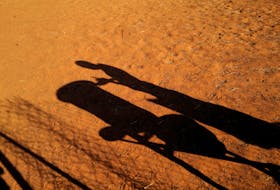RIVER HEBERT – Students at River Hebert District School have been so successful with a petition to reduce plastic in our oceans, they attracted a visit from the Canadian Wildlife Federation (CWF).
Manager of marine programs Sean Brillant visited the school Wednesday morning, while executive director Rick Bates communicated with the students via Skype, in appreciation for the students’ efforts in collecting names for the Plastics Reduction Petition.
The students have so far collected more than 500 signatures for the petition urging the federal government to move away from single-use plastic and recommit to and advance the National Sustainable Packaging Initiative set out in 2012.
“I did it because it was easy to do, and I knew it would make a difference,” said Grade 5 student Alex Poplar.
River Hebert resident Pam Harrison learned about the issue and brought the idea to the school, where she received an enthusiastic response.
“Mr. Cole, the librarian, spoke to all the children in the school and told them stories about plastic in our ocean, and gave out 1,000 petitions for the kids to bring back in,” explained Harrison. “Today, we have over 500 signed petitions we’ve sent in, trying to affect the government’s attitude towards the reduction of plastic in the water.”
The effort attracted the attention of the CWF.
Brillant spoke to elementary and high school students in two different groups, speaking about their work with the endangered North Atlantic Right Whale, and the things ordinary citizens can do to make the world better for wildlife: be aware of your impacts; changing behaviour; convincing others to change their behaviour; and demanding better from those who control or use our wildlife.
“You are going to be our decision makers,” Brillant told the students. “Don’t make old-fashioned decisions like we do. Make better decisions.”
The students presented a large “cheque” representing the number of signatures so far collected to Brillant.
“When you stop and think about the 185 kids in the school who are going to talk to 1,000 people about plastic, it’s a huge impact,” said Harrison.
The petition is one of many initiatives undertaken at the River Hebert school to impact the environment. This year they also started their own school garden, with students looking after its maintenance, even during the summer months. The results of that have included 150 bottles of preservatives that they sold, with proceeds to the international food grain bank. They have also made use of their crop of tomatoes to make salsa, which will be available for samples during an open house at the school this weekend.
It’s all about environmental stewardship, according to Principal Vern Taylor.
“In order to be a good community citizen and a good global citizen, one fundamental component, we believe, is our environment,” he said. “We live in a landscape where we have a lot of opportunities to engage with our environment – we have a World Heritage Site down the road, and we get to watch the tidal bore come in every day. So it’s important that these students take on the responsibility of being stewards of their environment.”









